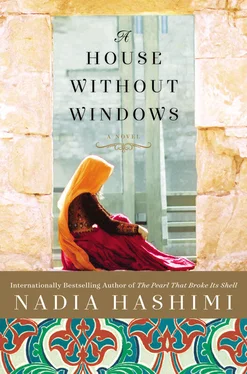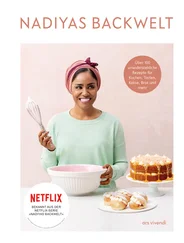“Good. Then I’ll ask you to speak to the judge. He’s a friend of yours, isn’t he?”
The mullah nodded.
“Does he not know who you are?” Gulnaz asked. “His family is from the same village.”
“We were boys then,” Habibullah said quietly. “He’s not once recognized me, and I don’t expect him to. I’m a different man now in many ways, including in my appearance.”
“That much is true,” Gulnaz muttered. “You’ve aged badly.”
“Then speak to him,” Yusuf said quickly. “He respects you and your efforts here. He considers you an expert and a pious man. Tell him Zeba is your daughter and beg him for leniency.”
“Tell him who I am?”
“Yes. He’s got to feel an obligation to do something for you. You can’t just be speaking up for a person who’s passed through your shrine. You’ve got to give him a real reason to listen to you.”
“That’s exactly what I was telling him,” Gulnaz said quietly. “The qazi may have mercy on her if he learns that she’s your daughter. It’s Zeba’s only hope.”
The mullah scratched at his beard, his thick eyebrows drawn together and his bottom lip puffed out. He was pouting, Yusuf realized.
“What’s wrong with you?” Gulnaz snapped. She was irked that there was silence where there should have been agreement. She turned her head just fractionally to address her husband. “Is that too much to ask of you?”
“Listen.” The mullah’s voice was a low roar. “I’ll do anything I can for her. I told her I would. But that doesn’t mean I have to jump headfirst into a well. I want to know if there’s a better way.”
“A better way that doesn’t involve you, isn’t that what you mean?”
“And for you, Khanum,” Yusuf said, tracing the rim of his teacup with his index finger. Gulnaz lifted her head but did not look at him. “I need you to do what you do best. Pay the qazi a visit and ask for mercy. She’s the mother of four children. She was a good daughter. Her husband was a terrible man. Tell him all of that and, most important, remind him of your talents.”
“My talents?” Gulnaz repeated softly.
“Yes, you know what I mean. It’s not something I would normally ask, but these are unique circumstances.”
“I understand,” Gulnaz nodded. “I’ll speak with him.”
Yusuf did not doubt that she would.
“And what about you? What else are you going to do?” the mullah asked.
Yusuf looked at the door and remembered the sight of chained men in the yard by the cells. He thought of the many hours he’d spent under the green lamps of the law library and the way Zeba had steeled herself when he suggested approaching the judge with what she’d seen Kamal doing to that girl.
He was not proud of his tactics, but he’d been troubled ever since he’d learned why Zeba had done what she’d done. He thought of Sultana and the way she’d walked out on him, indignant and beautiful.
Yusuf put the teacup back on the floor and clapped both hands against his thighs before pushing himself to stand.
“As for me, I’ve got one other idea, but if it’s going to do anything for Zeba, I need to get working on it. You both have my mobile number. The sentencing is on Thursday. Call me tomorrow and let me know what’s happened.”
They remained in their places long after he’d left, the irresistible need to retrace their steps preventing them from leaving. Age demanded that they not leave anything unsaid.
Once upon a time, Gulnaz recalled sullenly, there had been an afternoon when she had peered into a window and felt giddy at the thought of her life tied to this man’s by an invisible silver thread. Such an idea seemed astonishing now as they sat seething in each other’s presence.
YUSUF OPENED THE PLASTIC CONTAINER OF SAUTÉED SPINACH and rice Aneesa had brought him, the contents resembling a green-and-white yin-yang symbol. Famished, he took in the aromatic steam of the white rice, a blend of cumin and salt. She’d even brought two squares of fresh bread. Yusuf tore off a piece of bread and shaped it around a lump of spinach, pink threads of rhubarb mixed in. His cheeks were round with food when Sultana walked into the office.
Yusuf could not conceal his surprise. He stood and grabbed a napkin. Holding it over his mouth with one hand to conceal his chewing, he motioned her over. She’d seen him and nodded, making her way to his desk.
“I’m interrupting your lunch,” she said somewhat apologetically.
Yusuf hoped not to choke as he forced the food down quickly. He swiped the napkin over his lips and slid back into his chair. They were across from each other, just as they had been in the interview room of Chil Mahtab.
“Don’t worry about it,” he said, snapping the top back on the container. “Are you hungry? I could offer you some but—”
“Thank you, but I ate not long ago,” Sultana said. She was wearing the same olive-colored jacket with the sleeves rolled up. A yellow-and-green head scarf hid her hair, knotted high on her head. “Don’t stop on my account, please.”
“It’s fine. I wasn’t that hungry anyway,” Yusuf said, clearing his throat. There was one other lawyer in the office, but his desk was on the opposite side of the room and a half wall separated them. He’d looked up with interest to see Sultana enter and kept glancing over as he spoke on the phone. It was unusual, of course, to have a young woman visit.
“You got my message. I’m surprised to see you.”
“I’m sure you are. I could have called, but I thought it might be better to stop by.”
“I’m glad you did. Look, let me say that I’m sorry about the way our last conversation went. I didn’t mean to try to use you or manipulate you into a story.”
“But that’s what you were doing, wasn’t it?” She still had her handbag on her shoulder, and Yusuf wished she would set it down. She looked like she might walk out at any second.
“It. . it was,” he admitted. “Look, I’ve been struggling with Zeba’s case. It’s a tragedy from many angles, and as much as I’ve tried, well, the court just won’t see why she shouldn’t be hanged. The holes in the prosecutor’s case are forgiven, when they really shouldn’t be.”
“I’m sure that’s true. But do you honestly think that a man who burned a page of the Qur’an, if that’s what he did, should be killed by his wife? I don’t think you do, and that’s why I wanted to speak to you again. Maybe there’s a better angle to the story.”
Yusuf rested his elbows on the desk. It was Wednesday, about twenty-four hours from the time of the sentencing. He had yet to hear from Zeba’s parents. He’d called them both, but neither had answered the phone.
“I could tell you the whole story, but it’s an ugly one and not anything that you can print. The details can’t go public.”
“What is it?” Sultana was, of course, curious. It was her job to ask questions, and that was precisely why she’d made the trip into this office.
“I need you to promise to respect what Zeba’s kept private.”
“I promise.” Sultana slid the strap of her bag off her shoulder and let it rest on the floor. She sat back in the chair and listened as Yusuf told her about the little girl, his voice low and grim. She flinched, almost imperceptibly, but did not interrupt or move from the seat. Yusuf told her about Zeba’s fears that the girl would be shamed publicly if word got out, that the village would seek out the victim and her life would be ruined once again. He didn’t have to explain Zeba’s concerns. Sultana understood them in the way any woman would because it all came down to honor.
The girl had been stripped of her honor, of her future. If the world knew, she would never live a life without shame.
Читать дальше











